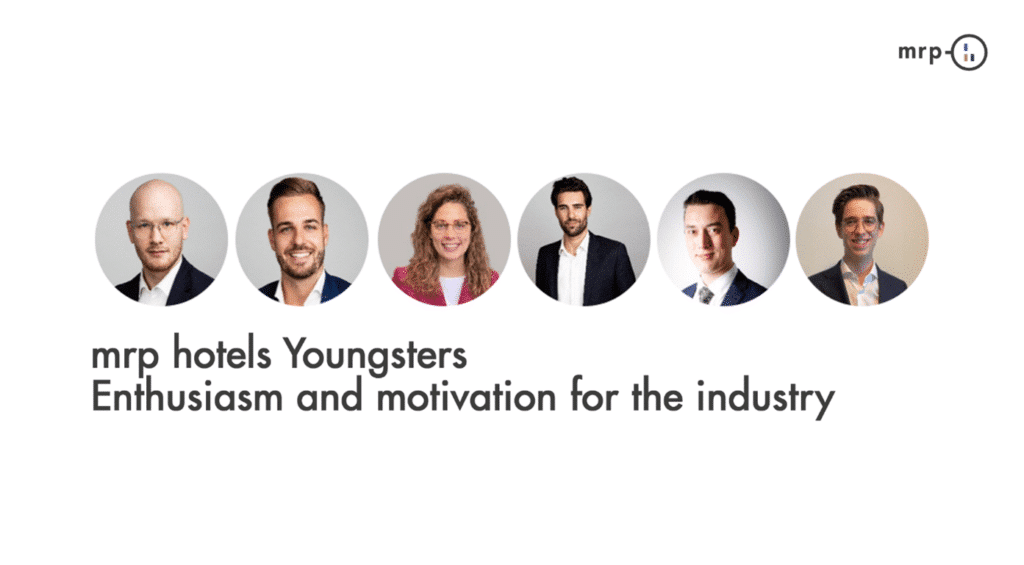“The youngsters of mrp hotels agree that extrinsic motivational factors (i.e. monetary incentives) alone do not necessarily ensure employee satisfaction in this industry and that (potential) employees need to have a “healthy portion” of passion, love for the industry and motivation.“
What motivation do youngsters have for the industry?
In the years leading up to COVID-19, the hotel industry had a reputation as a ” stable” workplace and therefore appealed to many. However, this changed radically in 2020, when the global hospitality industry was forced to temporarily cease operations and put countless employees on short-time work and lay off a substantial number of workers. As a result, the attractiveness of the industry declined, and many professionals reoriented their career as job stability in the hospitality industry was no longer a given. As a result, the companies (which have managed to economically “survive” the lockdowns) are in constant competition for talented skilled workers. To attract the best-trained workers, many companies use monetary incentives such as signing bonuses and similar. However, the youngsters at mrp hotels agree that such extrinsic motivational factors alone do not make people happy in this industry and that (potential) employees need to have a ” healthy portion” of passion, love for the industry as well as motivation.
What motivates our youngsters to pursue a career in this sector:
“The hotel industry is one of the most diverse and dynamic sectors. If you look at the “hotel industry map”, there is a variety of products available, some of them having truly exceptional concepts. And despite the Covid pandemic, new hotel projects are being realised all over the world”. “Although the consequences of COVID-19 for the hotel and gastronomy industry were undoubtedly disastrous, young people were given an exciting opportunity: hence, we had the ability to actively shape the industry. Prior to the pandemic, we repeatedly heard from fellow professionals that their ideas and creativity were restricted by experienced superiors with reasonings such as: “We have always done it this way” or “we have already experienced something similar and know what we have to do”. However, since we are facing unprecedented challenges, we’re given the opportunity to participate in the upcoming transformation with creative and innovative ideas.
How do the mrp youngsters see the industry’s future?
The hotel industry will be characterised by a strong upheaval and a general rethinking in the coming years. Hosts / operators, who show a strong adaptability will also be particularly marketable and crisis-resistant in the future. At this point, the brand hotel industry already benefits from synergies, technical advantages and a broad network. Individual hotels will encounter difficulties in offering a product that is contemporary from the customers’ perspective. It is essential to keep a close eye on the Zeitgeist and trends in the market to remain competitive.
The desire for freedom and individuality generated by the Covid crisis will contribute to the further reduction of average length of stays in accommodations. Terms such as “workation” and “home office” have become part of the daily work routine and have significantly shaped tourism as well. Domestic tourism has experienced a revival and shorter trips in one’ s own country, e.g. over long weekends, will continue in the future.
What has changed in the last months?
Pandemic-related restrictions such as the shutdown of cultural attractions, restaurants, and even imposed curfews represented unprecedented measures, especially for the younger generations. The regained “freedom” of the past weeks due to loosening of the restrictions has made it particularly evident that a new, strengthened awareness of leisure time and quality of life has anchored in the population. While leisure, cultural activities, gastronomic visits and holiday trips are still subject to numerous safety regulations, visitors and guests are willing to accept the associated inconveniences to be able to enjoy these activities. This new awareness of leisure activities has a lasting influence on consumer behaviour and thus creates opportunities for new and innovative cultural, gastronomic and tourism offers.
What are the “youngsters” excited about?
Since the last year was mainly characterised by restrictions, uncertainty and social distance, there is great optimism and excitement about a return to normality. The anticipation is especially extensive when it involves reuniting with friends and colleagues, the manifold experiences in the hospitality industry and daily personal freedoms without feeling the uncertainty of the past year. Although there is great enthusiasm for the familiar and the traditional, we hope that the crisis will rather be recognised as an opportunity for rethinking and upheaval in society. Above all, topics such as digitalisation and sustainability, which were widely discussed during the pandemic, should receive attention in the future and be seen as initial “learnings” that must be further developed and advanced.

